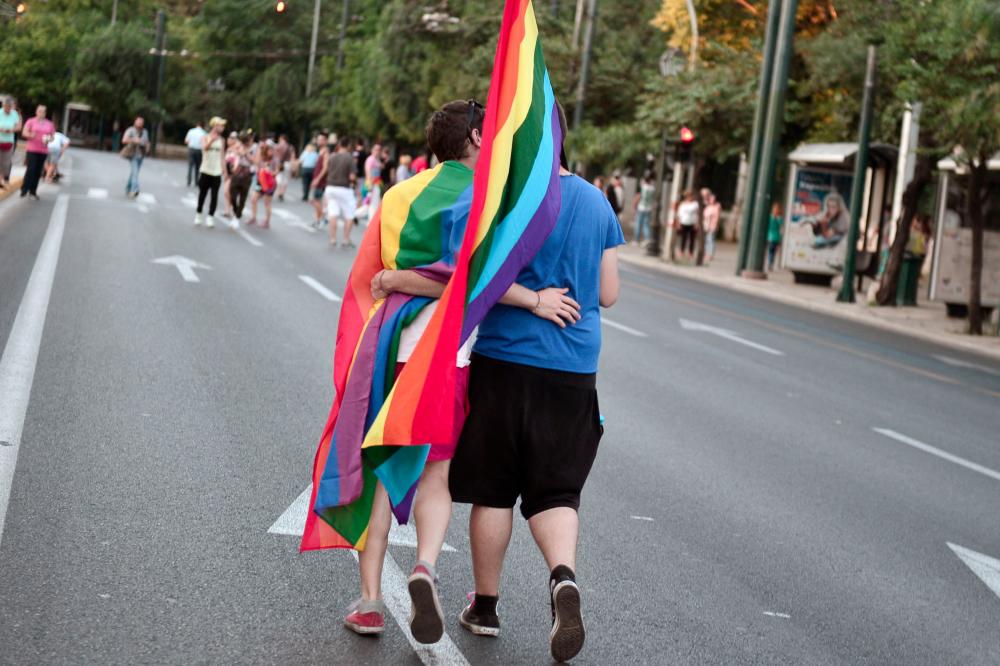ATHENS: For as long as he can remember, 16-year-old Yannis Belia has had a “second mother” invisible in the eyes of Greek family law.
That’s about to change this week, when lawmakers approve a historic bill legalising same-sex marriage and adoption.
“Until now, my second mother has been like a ghost in the eyes of the law. She didn’t appear anywhere, on any official document,“ the teen told AFP at a gay bar in Athens.
“This law is going to change my life,“ he said.
Yannis’ biological mother, Stella, underwent medically assisted reproduction to bear him and his twin brother Antonis.
But Stella’s partner Haris, who has shared her life for 12 years, was until now ineligible to act as the boys’ second parent.
It is one of many legal complications in the lives of the Belia boys, and others like them, that the new law aims to end.
When their children fall ill in Greece, non-biological parents currently have no right to decide what medical procedures are necessary for them.
Children also cannot inherit from their non-biological parents.
And if the biological parent dies, the state automatically takes the children away from their other parent.
“If my mother Stella were to die, I couldn’t be entrusted to my second mother. It’s a fear that’s always been in the back of my mind,“ said Yannis.
If a child has two fathers, they cannot even be registered with the civil registry, where it is compulsory to enter the name of the mother. Nor can they be covered by Greek social security.
“At last, all children will have the same rights,“ Antonis Belia said.
There are currently no reliable statistics on the number of same-sex families raising children in Greece.
The issue is a strong taboo for a large part of Greek society -- and for the powerful Orthodox Church of Greece.
Some 4,000 people - brandishing Greek flags and crosses - protested against the bill in central Athens Sunday, responding to a call by Orthodox religious groups.
Grigorios Grigorakis, a 57-year-old from Florina, northern Greece, came clutching an icon of the Virgin Mary, and told AFP that “Christ and the Gospel say that a family is a man, a woman and children.”
Even Prime Minister Kyriakos Mitsotakis, who is personally championing the bill, was careful to stress last month that the changes would benefit just “a few children and couples”.
The bill is expected to split Mitsotakis’ conservative New Democracy, with dozens of the party’s 158 lawmakers likely to oppose it or abstain.
- ‘Totally opposed’ -
The Church of Greece -- which has close ties to many government MPs -- has said it is “totally opposed” to the reform, arguing that it “condemns” children to grow up in an “environment of confusion”.
However, the bill is sure to pass with the support of the main opposition Syriza party, whose leader Stefanos Kasselakis is gay, the socialist Pasok party and other smaller parties.
Mitsotakis has said existing assisted reproduction rules will not be modified to allow same-sex couples the right to surrogacy.
Opinion polls indicate that a majority of Greeks support same-sex marriage but oppose surrogacy.
Stella Belia, a schoolteacher in her fifties, said the prevalent attitude in Greece regarding same-sex couples was “the rule of silence.”
- ‘Never hide’ -
“We often heard: ‘It’s better to lie for your family and not say you’re in a relationship with a woman’. We should never have had to hide!” she asserted.
“I’ve never felt strange in Greek society. I’ve never had any serious problems with my classmates. I’m white, Orthodox and heterosexual,“ said Yannis.
Greece had been condemned for anti-gay discrimination by the European Court of Human Rights in 2013, after gay couples were excluded from a prior civil unions law in 2008.
While Stella admits the new legislation will be a “huge step forward for Greece,“ it is still far from perfect.
Same-sex couples will still not be able to use assisted reproduction or a surrogate mother, procedures reserved for single women or heterosexual couples who have trouble conceiving.
Nor will adoption of the child by the second parent be automatic, even if the couple is married, as it will take place after birth.
It was a hurdle vividly experienced by Anna Leventou, whose partner Nancy was hospitalised for several days after giving birth to their daughter.
“I was in a panic. They took my wife to the emergency room and I couldn’t take my daughter,“ Leventou told a recent press conference organised by Rainbow Families Greece, an NGO helping LGBTQ families.
Thanks to the new law, London-based Konstantinos Androulakis says he could consider returning to Greece.
For now he plans to be in Athens for the “historic day” when the law is approved next week.
“Until now, we couldn’t imagine raising our children in Greece without basic rights. After February 15, everything is possible again,“ said Androulakis, whose adopted children with partner Michael are now 11 and six. - AFP









